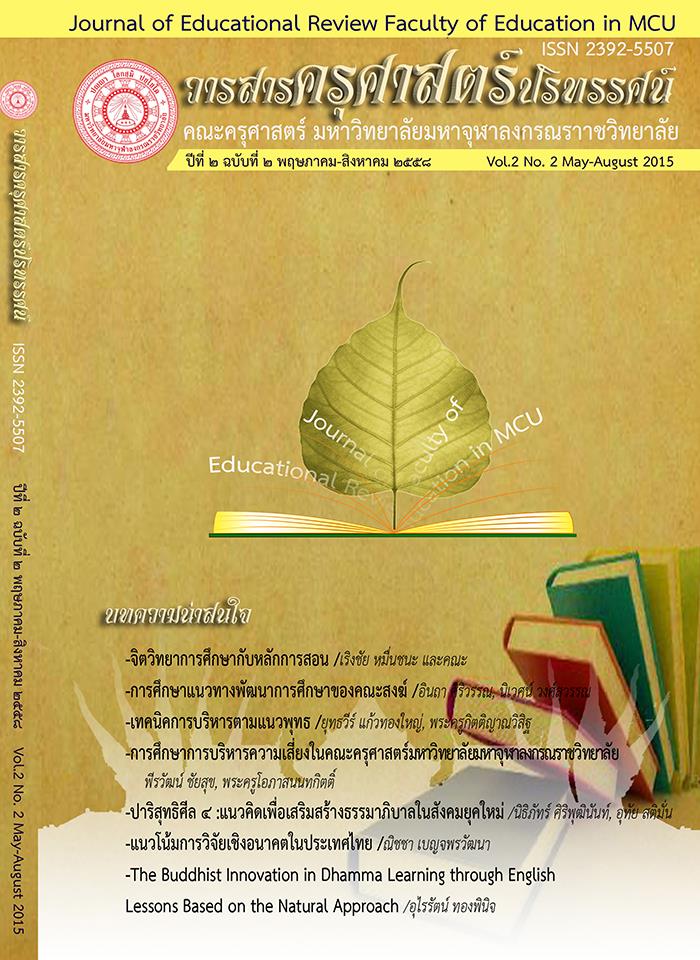PHRAPARIYATTIDHAMMA CURICULUM DEVELOPMENT IN DHAMMA SECTION FOR PHRAPARIYATTIDHAMMA SCHOOLS IN SANGHA ADMINISTRASTIVE REGION 3
Main Article Content
Abstract
The objectives of this article were: 1. to study internal supervision status of Phrapariyattidhamma schools in Dhamma Section, 2. to create and develop internal supervision strategy for Phrapariyattidhamma schools in Dhamma Section, and 3. To propose internal supervision strategy for Phrapariyattidhamma schools in Dhamma Section in Sangha Administrative Region 3. The results of the study found that:
1. The present status and problems of Phrapariyattidhamma schools; 1) In academic, the administration emphasized the main subjects in the study courses, 2) in teaching management, the teachers’ qualification was below the standard and the instructional medias were not matched with student numbers, 30 in technology, books, medias and printed materials were not sufficient to students and the teaching and learning were focused on memorizing. The tutoring for the examination was arranged once a year before the Dhamma examination, 4) in supervision, philosophy, vision, mission, workload, objectives and aims should be included in the supervision, and 5) in evaluation, there were students who passed, failed and absent the examination. The newly ordained monks kept ready to disrobe at the end of the Rain Retreat.
2. In development of internal supervision strategy for Phrapariyattidhamma schools in Dhamma Section, 1) In academic, executives, and teachers should focus on self-control, man-management and work-orienting for the success of oneself and organizations, and 2) In Dhamma curriculum administration, suitable course contents should arranged for monks and novices.
3. The strategy in internal supervision for Phrapariyattidhamma schools consisted of 5 main factors: 1) strategic planning, 2) strategic networking, 3) strategic development, 4) strategic tools and media, and 5) strategic evaluation.
Article Details
ทัศนะและความคิดเห็นที่ปรากฏในบทความในวารสารฉบับนี้ถือเป็นความรับผิดชอบของผู้เขียนบทความนั้นเพียงผู้เดียว และไม่ถือเป็นทัศนะและความรับผิดชอบของกองบรรณาธิการ
กองบรรณาธิการขอสงวนสิทธิ์ในการคัดเลือกบทความลงตีพิมพ์และจะแจ้งให้เจ้าของบทความทราบหลังจากผู้ประเมินบทความตรวจอ่านบทความแล้ว
ต้นฉบับที่ได้รับการตีพิมพ์ในวารสารครุศาสตร์ปริทรรศน์ คณะครุศาสตร์ มหาวิทยาลัยมหาจุฬาลงกรณราชวิทยาลัย ถือเป็นกรรมสิทธิ์ของคณะครุศาสตร์ มหาวิทยาลัยมหาจุฬาลงกรณราชวิทยาลัย ห้ามนำข้อความทั้งหมดหรือบางส่วนไปพิมพ์ซ้ำ เว้นเสียแต่ว่าจะได้รับอนุญาตจากมหาวิทยาลัยฯ เป็นลายลักษณ์อักษร


